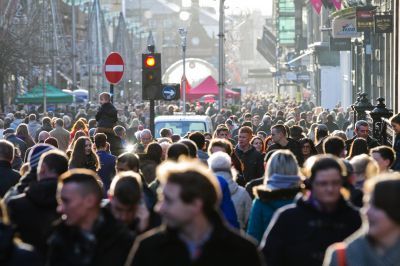
LIFE expectancy in Scotland still remains lower than the UK but has seen an increase in the past 30 years.
LIFE expectancy in Scotland has improved in the last three decades but remains lower than the UK as a whole, according to new figures. Boys born around 2013 can now expect to live to the age of 77.1 while girls can expect to live to 81.1, National Records of Scotland (NRS) figures showed. The figures are an increase of eight and 5.8 years respectively on 30 years ago. However, life expectancy in Scotland remains lower than the UK as a whole where in 2011-2013 it was estimated as 82.7 years for women and 78.9 years for men. Within Scotland, there is also a wide variation in life expectancy at birth between different council areas, with Glasgow the lowest at 73 for men and 78.5 for women. The picture is different in neighbouring East Dunbartonshire, where people can expect to live the longest of any in Scotland, 80.5 for men and 83.9 for women. Tim Ellis, Registrar General of Scotland, said: “This is a time of substantial demographic change: the population is increasing and ageing. “The ageing population is the most distinctive current demographic development and will bring both opportunities and challenges. “Life expectancy at birth in Scotland, while increasing, is lower than in the UK as a whole and lower than a lot of other developed countries. There is also considerable local variation in life expectancy.” The figures come from the NRS document Scotland’s Population 2014 – the Registrar General’s Annual Review of Demographic Trends, published today. The estimated population of Scotland reached 5,347,600 on June 30 last year, the highest level ever recorded. The report said this was due to 17,600 more people coming to Scotland than leaving, and 3,500 more births than deaths. There were 56,725 births registered in Scotland in 2014, with 711 (1.3%) more in 2014 than in 2013. This is the first rise following five consecutive annual decreases in the number of births. Deaths dropped, with 54,239 deaths registered in Scotland in 2014, which was 461 (0.8%) fewer than in 2013. The top causes of death were cancer (15,840), ischaemic (coronary) heart disease (6,872) and respiratory system diseases (6,707). In the year to June 30 2014, 82,440 people came to Scotland (from the rest of the UK and from overseas) and 64,860 left Scotland (to the rest of the UK and overseas). This resulted in a net gain of 17,580. Mr Ellis said: “In the last half of the 20th century, more people tended to leave Scotland than move here. However, since 2001, this has changed, with more people moving to Scotland than leaving.” The figures also showed there were were 29,069 marriages in Scotland in 2014, of which 367 were same-sex marriages following the Marriage and Civil Partnership (Scotland) Act 2014 coming into force on December 16, 2014. There were also 436 civil partnerships – 193 male couples and 243 female couples. The average age at which people marry for the first time has increased by about two years since 2004, to 33.2 years for men and 31.4 years for women in 2014. In 2014, there were 455 adoptions recorded in Scotland, about a quarter of what it used to be in the early 1970s.

Enjoy the convenience of having The Sunday Post delivered as a digital ePaper straight to your smartphone, tablet or computer.
Subscribe for only £5.49 a month and enjoy all the benefits of the printed paper as a digital replica.
Subscribe